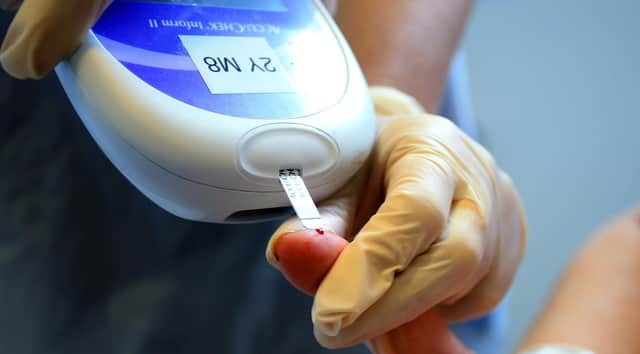The growing cost of diabetes in Scotland as cases continue to rise


Figures released by Public Health Scotland show the number of prescriptions issued for medicine to treat diabetes has increased by 13 per cent over a four year period.
In 2018/19, there were 3,816,571 prescriptions for diabetes medication administered, but by last year (2022/23) that figure had jumped to 4,266,853.
Advertisement
Hide AdAdvertisement
Hide AdThe increase in number has brought an associated hike in the costs to the Scottish Government, which now shells out around £118m a year - nearly £20m than in 2018/19.


Diabetes UK has also reported an increase in diagnoses of diabetes in both Scotland and the rest of the UK.
The Scottish Public Health Observatory believes that the largest part of the increase in type 2 diabetes “is likely to be due to poor diet (specifically excess energy intake), low levels of physical activity and the resulting increase in levels of obesity”.
For the UK as a whole, the number of people living with diabetes has followed a similar pattern, increasing from 3,590,501 to 4,264,477. In 2020 there were close to 13,500 deaths of people who were diagnosed with diabetes.
Scottish Conservative MSP Maurice Golden said the rising numbers of diabetes prescriptions “presents a serious public health challenge”.
“It is a disease that can lead to a number of other complications and often places serious restrictions on a patient’s quality of life,” said Mr Golden.
“Many of these cases are unavoidable and unfortunate, and the NHS is working hard to support these people.
“But we also need to recognise that healthier and more active lifestyles can help reduce the chances of diabetes as well as having a number of other benefits.”
Advertisement
Hide AdAdvertisement
Hide AdThe Scottish Government committed to invest £42m over five years, from 2018/2019, to give “people with, or at risk of type 2, diabetes support and better access to effective weight management services”.
In July 2018, the government published a framework detailing action for the prevention, early detection and early intervention of type 2 diabetes, called ‘Healthier Future’.
The framework provides national guidance to NHS Boards on the provision of evidence-based weight management interventions - including very low calorie diets and total diet replacement programmes with staged food reintroduction.
John Kinnear, National Director at Diabetes Scotland: “With the prevalence of diabetes on the rise in Scotland and the cost of treatments increasing, it should come as no surprise to see more being spent on prescriptions for diabetes medication.
“These essential medications help people with diabetes manage their condition and reduce the risk of developing devastating diabetes-related complications, such as sight-loss, limb and organ damage, and even early death.
“However, it doesn't have to be this way and with the right care and support, cases of type 2 diabetes can be prevented or put into remission.”
Comments
Want to join the conversation? Please or to comment on this article.